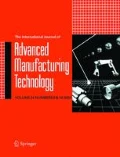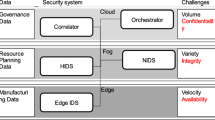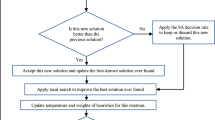Abstract
Increased complexity of current manufacturing systems together with dynamic conditions and permanent demands for flexible and robust functionality makes their management and control very difficult and challenging. Workflow simulation is an effective approach to investigate dynamic workflow scheduling policies and evaluate the overall manufacturing system performance. The results attained in simulation model can give directions on how to maximize system output when selecting an appropriate scheduling practice for a real system. In this paper, we investigate the abilities of multi-agent systems in combination with dynamic dispatching rules and failure handling mechanisms to manage dynamic environment conditions (such as machine failures) for systems in the production automation domain. We measure system robustness by systematically assessing the total system performance (e.g., number of finished products) in a number of representative test cases. We use an agent-based simulation environment, MAST, which has been validated with real-world hardware to strengthen the external validity of the simulation results. We investigated the performance of a re-scheduling component which uses four different policies that define how to adjust the system schedule in case of machine disturbances/failures. In the context of the empirical study the Complete Rerouting re-scheduling policy outperformed all other policies.
Similar content being viewed by others
References
Tichy P, Slechta P, Staron RJ, Maturana FP, Hall KH (2006) Multiagent technology for fault tolerance and flexible control. IEEE Trans Syst Man Cybern C Appl Rev 36(5):700–704
Heragu S, Graves R, Kim B-I, St Onge A (2002) Intelligent agent based framework for manufacturing systems control. Syst Man Cybern A Syst Hum IEEE Trans 32:560–573
Jennings NR, Wooldridge MJ (1998) Agent technology: foundations, applications, and markets. Springer, Heidelberg
Shen W, Norrie DH (1999) Agent based systems for intelligent manufacturing: a state of the art survey. Int J Knowl Inf Syst 1(2):129–156
Jennings NR, Bussman S (2003) Agent-based control systems: why are they suited to engineering complex systems? IEEE Control Syst Mag 23(3):61–73
Pechouček M, Marík V (2008) Industrial deployment of multi-agent technologies: review and selected case studies. Auton Agents MultiAgent Syst 17:397–431
Hsieh F (2009) Collaborative reconfiguration mechanism for holonic manufacturing systems. Automatica 45:2563–2569
Holthaus O (1997) Design of efficient job shop scheduling rules. Comput Ind Eng 33(1–2):249–252
Schönberger J, Kopfer H (2009) A general approach to robustness in logistics—basic concepts, quantification approaches and experimental evaluations. Logistik Management 3:299–323
Kutanoglu E, Sabuncuoglu I (2001) Routing-based reactive scheduling policies for machine failures in job shops. Int J Prod Res 39:3141–3158
Bastos R, Oliveira F, Oliveira J (2005) Autonomic computing approach for resource allocation. Expert Syst Appl 28:9–19
Wu J, Durfee EH (2007) Sequential resource allocation in multi-agent systems with uncertainties. In Proceedings of the 6th International Joint Conference on Autonomous Agents and Multiagent Systems
Vieira GE, Hermann JW, Lin E (2003) Re-scheduling manufacturing systems: a framework of strategies, policies and methods. J Sched 6(1):36–92
Smith RG (1980) The contract net protocol: high-level communication and control in a distributed problem solver. IEEE Trans Comput 29:1104–1113
Vrba P, Mařík V, Merdan M (2008) Physical deployment of agent-based industrial control solutions: MAST story. In Proceedings of IEEE International Conference on Distributed Human–Machine Systems, Athens, March 9–12, 2008; pp 133–139
Vrba P (2003) MAST: Manufacturing Agent Simulation Tool. In Proceedings of IEEE Conference on Emerging Technologies and Factory Automation, September 2003, Lisbon, Portugal, Volume 1, pp. 282–287
Sabuncuoglu I, Bayiz M (2000) Analysis of reactive scheduling problems in a job shop environment. Eur J Oper Res 126(3):567–586
Ouelhadj D, Petrovic S (2008) Survey of dynamic scheduling in manufacturing systems. Journal of Scheduling, October 2008, http://www.springerlink.com/content/gq81525hm27872up/
Merdan M, Moser T, Wahyudin D, Biffl S, Vrba P (2008) Simulation of workflow scheduling strategies using the MAST test management system. The 10th IEEE International Conference on Control, Automation, Robotics and Vision, ICARCV 2008
Merdan M, Moser T, Wahyudin D, Biffl S (2008) Performance evaluation of workflow scheduling strategies considering transportation times and conveyor failures. In Proceedings of IEEE International Conference on Industrial Engineering and Engineering Management, Singapore
Kutanoglu E, Sabuncuoglu I (1995) An investigation of reactive scheduling policies under machine breakdowns. In Proceedings of the 4th Industrial Engineering Research Conference pp 904–913
Babiceanu R, Chen F (2006) Development and applications of holonic manufacturing systems: a survey. J Intell Manuf 17(1):111–131
Boccalatte A et al (2004) A multi-agent system for dynamic just-in-time manufacturing production scheduling. In: 2004 IEEE International Conference on Systems, Man and Cybernetics, pp. 5548–5553 vol.6
Kocjan W (2002) Dynamic scheduling: state of the art report. Available at: http://citeseerx.ist.psu.edu/viewdoc/summary?doi=10.1.1.13.7135. Accessed 25 Sept 2009
Merdan M (2009) Knowledge-based multi-agent architecture applied in the assembly domain. PhD Thesis. Vienna University of Technology. Available at: http://www.ub.tuwien.ac.at/diss/AC05040230.pdf. Accessed 15 Apr 2010
Sadeh N (1991) Look-ahead techniques for micro-opportunistic job shop scheduling. PhD Thesis. Carnegie Mellon University, Pittsburgh
Ouelhadj D, Petrovic S (2009) A survey of dynamic scheduling in manufacturing systems. J Sched 12(4):417–431
Sandholm TW (2000) Automated contracting in distributed manufacturing among independent companies. J Intell Manuf 11(3):271–283
Shen W, Wang L, Hao Q (2006) Agent-based distributed manufacturing process planning and scheduling: a state-of-the-art survey. Syst Man Cybern C Appl Rev IEEE Trans 36(4):563–577
Wang C, Ghenniwa H, Shen W (2008) Real time distributed shop floor scheduling using an agent-based service-oriented architecture. Int J Prod Res 46(9):2433–2452
Aytug H, Lawley MA, McKay K, Mohan S, Uzsoy R (2005) Executing production schedules in the face of uncertainties: a review and some future directions. Eur J Oper Res 161:86–110
Leon VJ, Wu SD, Storer RH (1994) Robustness measures and robust scheduling for job shops. IIE Trans 26:32
Pfeiffer A, Kadar B, Monostori L (2007) Stability-oriented evaluation of rescheduling strategies, by using simulation. Comput Ind 58:630–643
Leitao P (2009) Agent-based distributed manufacturing control: a state-of-the-art survey. Eng Appl Artif Intell 22:979–991
Bussman S, Jenning NR, Wooldridge M (2004) Multiagent system for manufacturing control. A design methodology. Springer Series on Agent Technology
Zhang D, Anosike A, Lim MK (2007) Dynamically Integrated Manufacturing Systems (DIMS)—a multiagent approach. Syst Man Cybern A Syst Hum IEEE Trans 37:824–850
Cauvin A, Ferrarini A, Tranvouez E (2009) Disruption management in distributed enterprises: a multi-agent modelling and simulation of cooperative recovery behaviours. Int J Prod Econ 122:429–439
Guo B, Nonaka Y (1999) Rescheduling and optimization of schedules considering machine failures. Int J Prod Econ 60:503–513
Sabuncuoglu I, Goren S (2009) Hedging production schedules against uncertainty in manufacturing environment with a review of robustness and stability research. Int J Computer Integr Manuf 22:138
Ferber J, Gutknecht O, Michel F (2004) From agents to organizations: an organizational view of multi-agent systems. Agent-Oriented Software Engineering IV:443–459
Van Dyke PH (2000) A practitioners’ review of industrial agent applications. Auton Agents Multi-Agent Syst 3:389–407
Vrba P, Mařík V (2010) Capabilities of dynamic reconfiguration of multiagent-based industrial control systems. IEEE transactions on systems, man, and cybernetics. A Syst Hum 40(1):1–11
Hsieh F (2010) Design of reconfiguration mechanism for holonic manufacturing systems based on formal models. Eng Appl Artif Intell 23:1187–1199
Hsieh F, Chiang CY (2010) Collaborative composition of processes in holonic manufacturing systems. Computers in Industry (in press), http://www.sciencedirect.com/scidirimg/clear.gif. doi:10.1016/j.compind.2010.05.012
Author information
Authors and Affiliations
Corresponding author
Rights and permissions
About this article
Cite this article
Merdan, M., Moser, T., Vrba, P. et al. Investigating the robustness of re-scheduling policies with multi-agent system simulation. Int J Adv Manuf Technol 55, 355–367 (2011). https://doi.org/10.1007/s00170-010-3049-9
Received:
Accepted:
Published:
Issue Date:
DOI: https://doi.org/10.1007/s00170-010-3049-9




